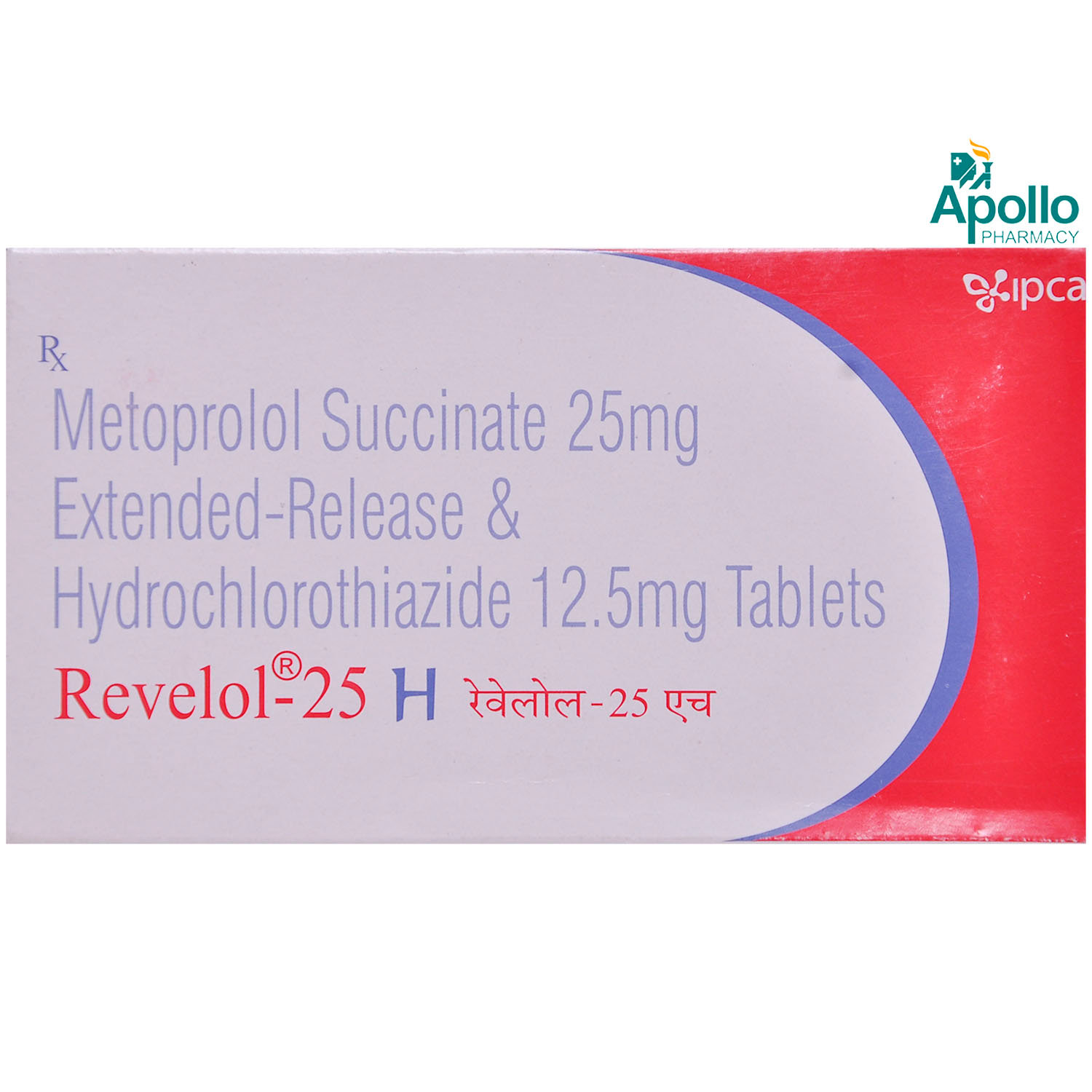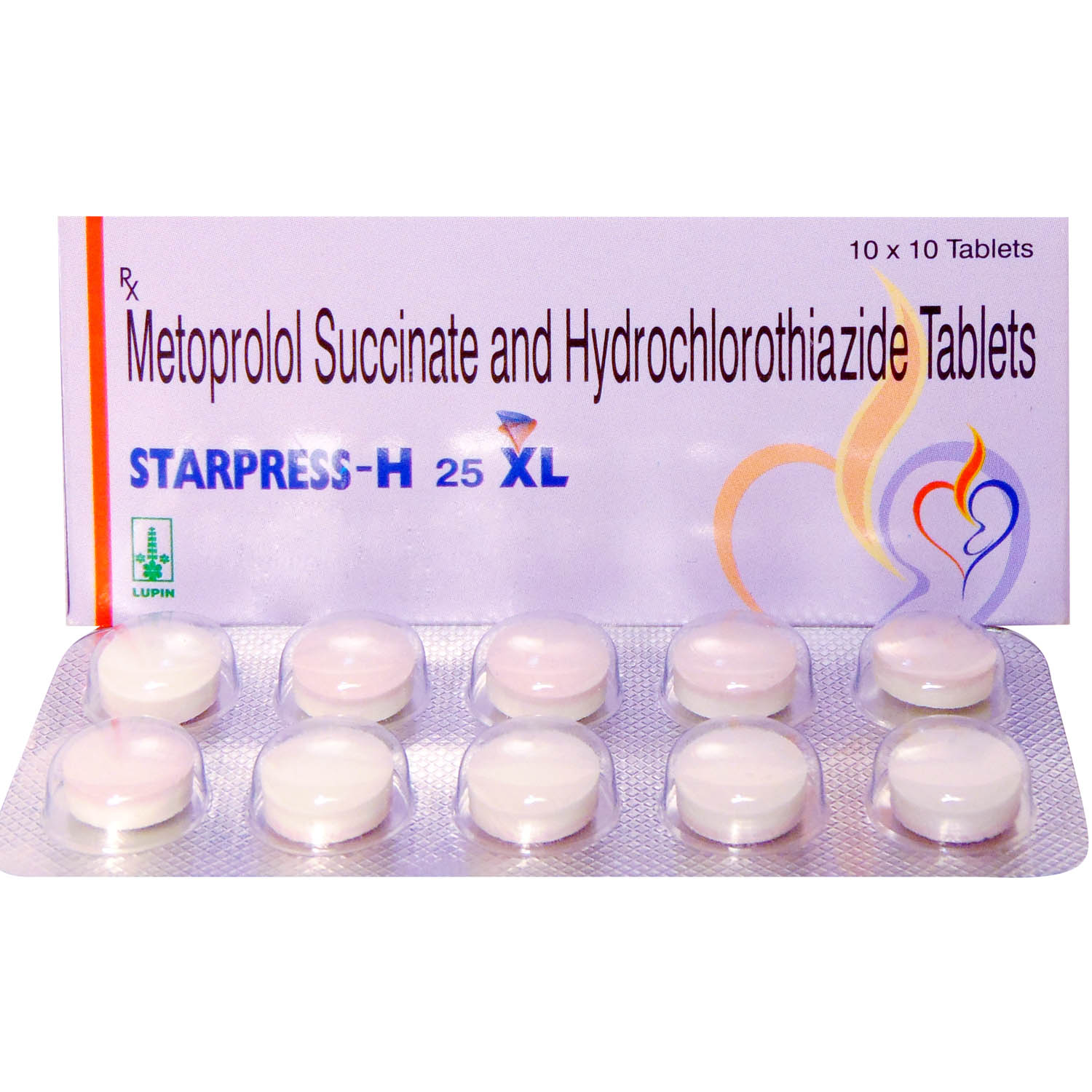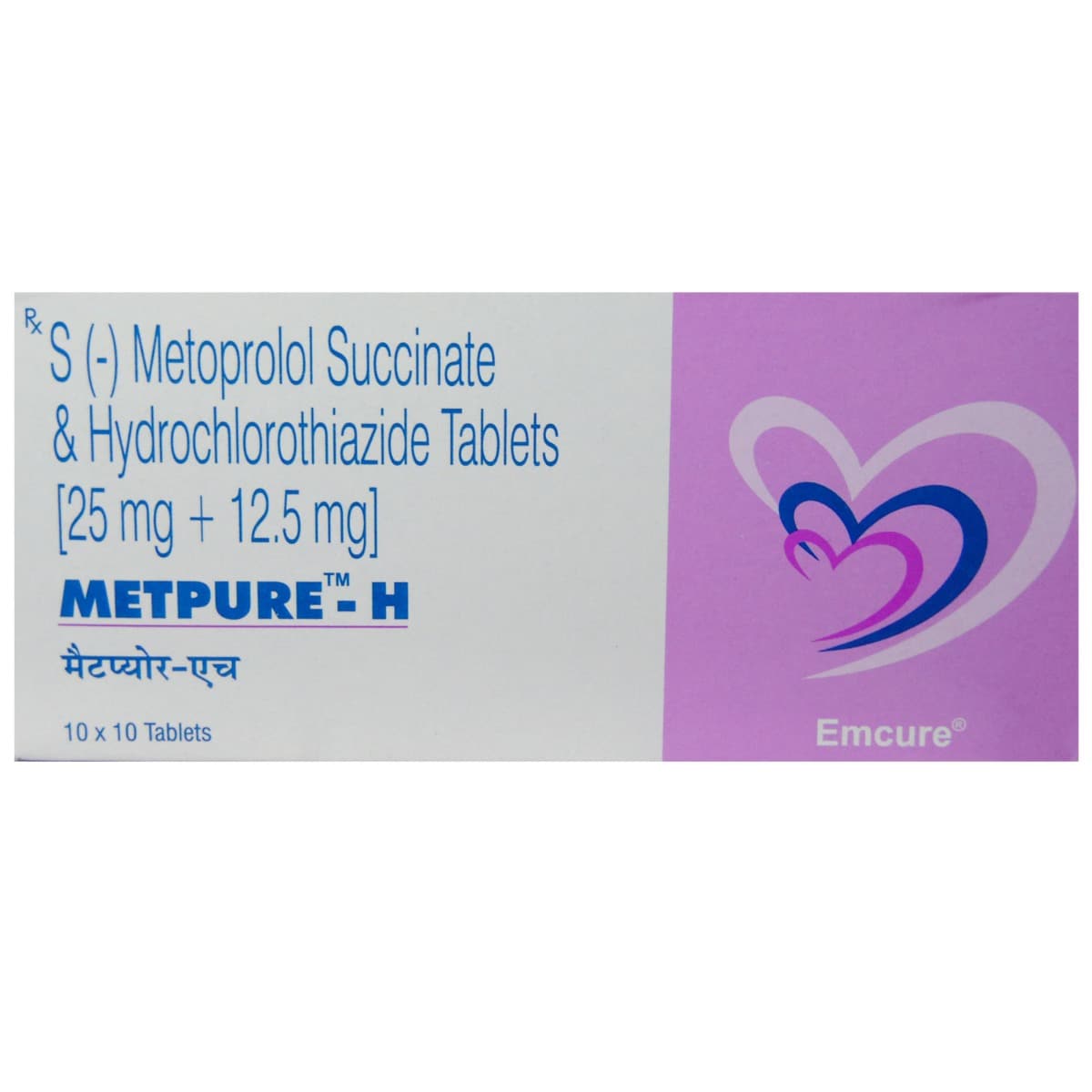Embeta Ht 25mg Tablet 10's
MRP ₹109.5
(Inclusive of all Taxes)
₹16.4 Cashback (15%)
Provide Delivery Location
Online payment accepted
 Prescription drug
Prescription drugWhats That
Composition :
Manufacturer/Marketer :
Consume Type :
Expires on or after :
Return Policy :
About Embeta Ht 25mg Tablet
Embeta Ht 25mg Tablet belongs to the class of anti-hypertensives, primarily taken to treat hypertension (high blood pressure) and reduce stroke risk in patients with high blood pressure. Embeta Ht 25mg Tablet is a combination medication generally used when a single medicine is unable to control high blood pressure. Hypertension or high blood pressure is a life-long or chronic condition in which the force exerted against the artery wall becomes too high. It can lead to the risk of heart diseases like heart attack and stroke.
Embeta Ht 25mg Tablet is a combination of two medicines: Metoprolol and Hydrochlorothiazide. Metoprolol belongs to the class of drugs known as β-blockers that works by relaxing the blood vessels by blocking the action of certain natural substances in your body. It helps slow down the heart rate, making it easier to pump more blood around your body and lower blood pressure. On the other hand, Hydrochlorothiazide is a diuretic or water pill that works by removing extra water/fluid and certain electrolyte overload from the body. Together, Embeta Ht 25mg Tablet lowers fluid overload, raises blood pressure, improves blood flow, and reduces the future risk of a heart attack and stroke. This medicine needs to be taken regularly to be effective.
Take Embeta Ht 25mg Tablet as prescribed by your doctor. Depending on your medical conditions, you are advised to take Embeta Ht 25mg Tablet for as long as your doctor has prescribed it for you. You may experience nausea, fatigue, constipation, diarrhoea, headache, dizziness, increased blood uric acid, slow heart rate, decreased potassium level in the blood, altered blood lipid level, glucose intolerance, increased calcium level in the blood, and decreased magnesium level in blood. Most of these side effects of Embeta Ht 25mg Tablet do not require medical attention and gradually resolve over time. However, if the side effects are persistent, reach out to your doctor.
Inform your doctor if you have had an allergic reaction to Embeta Ht 25mg Tablet , have liver disease, kidney disease, asthma, heart failure, a heart valve problem, or have a history of a heart attack. Pregnant and breastfeeding women should consult their doctor before taking Embeta Ht 25mg Tablet . Orthostatic hypotension (sudden lowering of blood pressure) might occur, so patients taking Embeta Ht 25mg Tablet should get up with caution. A prolonged intake of Embeta Ht 25mg Tablet may decrease your blood potassium levels. So, it is better to ask your doctor about foods high in potassium, like bananas or orange juice. Regular monitoring of blood pressure, kidney function, and electrolyte (sodium, potassium, calcium, etc.) are recommended while taking Embeta Ht 25mg Tablet . And also, a healthy diet and regular exercise are necessary to keep blood pressure under control.
Uses of Embeta Ht 25mg Tablet
Directions for Use
Key Benefits
Embeta Ht 25mg Tablet contains a combination of medicines: Metoprolol (beta-blockers) and Hydrochlorothiazide (thiazide diuretic or water pill). Metoprolol plays a vital role in relaxing our blood vessels by blocking the action of certain natural substances in our bodies. It helps slow down the heart rate, making it easier to pump more blood around your body and lower blood pressure. Hydrochlorothiazide is a diuretic that prevents excess salt absorption in the body, preventing fluid retention. Collectively, both help reduces blood pressure and the chance of a stroke, heart attack, and oedema (fluid overload).
Storage
Drug Warnings
Don't stop taking Embeta Ht 25mg Tablet without talking to your doctor first. Stopping Embeta Ht 25mg Tablet gradually may cause changes in your heart rhythm and blood pressure, cause chest pain, or a heart attack. Your doctor will lower your dose gradually over a period of time to help prevent these symptoms. You should not use Embeta Ht 25mg Tablet if you have allergic to Embeta Ht 25mg Tablet , have low blood pressure (less than 90 mm of Hg), very slow heartbeat, serious lung condition (like asthma), serious heart condition (sick sinus syndrome), or any heart blockage. Do not use Embeta Ht 25mg Tablet if you are pregnant, planning for pregnancy, breastfeeding, or unable to urinate (anuria). It should not be given to the children as safety and effectiveness have not been established. Before taking Embeta Ht 25mg Tablet you should tell the doctor if you have any muscle disorder (myasthenia gravis, rhabdomyolysis), breathing problem (COPD, bronchitis, emphysema), low blood sugar level (hypoglycemia), eye problem (glaucoma), low blood pressure (hypotension), depression, previous heart failure, liver/kidney disease, thyroid hormone disorder like overactive thyroid (hyperthyroidism), adrenal gland cancer, or severe blood circulation problem (Raynaud’s syndrome). You should monitor your blood pressure regularly to make sure the Embeta Ht 25mg Tablet is working efficiently. Besides this, prolonged intake of Embeta Ht 25mg Tablet can lead to lowering of blood pressure (hypotension). So, daily monitoring of blood pressure is advisable.
Diet & Lifestyle Advise
- Consume antioxidant-rich food. Blueberries, cherries, tomatoes, squash, and bell peppers are high in antioxidants.
- Eat natural diuretic foods. Asparagus, beets, green beans, grapes, onion, leafy greens, pineapple, leeks, pumpkin, and garlic are all-natural diuretic foods.
- Use healthy cooking oils like soybean, olive, canola, and coconut oil.
- You should avoid refined foods such as white bread, spaghetti, sugar, and red meat.
- Reduce or eliminate Trans fatty acids, which are found in commercially baked items such as cookies, cakes, crackers, French fries, onion rings, doughnuts, and processed foods.
- Avoid the consumption of too much salt or salty food.
- Keep your weight under control with a BMI of 19.5-24.9.
- Regular physical activity or exercise like walking improves your blood flow.
- When possible, elevate your legs or the swollen area on a chair or pillows.
- Avoid standing or sitting for extended periods of time.
- Avoid chronic stress as it can raise your blood pressure.
- Spend time with your loved ones to cope with stress and practice mindfulness techniques.
- Quitting smoking and alcohol consumption is the best strategy to lower the risk of many health complications.
Side Effects of Embeta Ht 25mg Tablet
- Nausea
- Fatigue
- Headache
- Dizziness
- Diarrhoea
- Stuffy nose, sore throat
- Slow heart rate
- Increased blood uric acid
- Decreased potassium/ magnesium level in the blood
- Increased calcium level in the blood
- Altered blood lipid level
- Glucose intolerance
Habit Forming
Therapeutic Class
All Substitutes & Brand Comparisons
RX
Out of StockMETOCARD H 25MG TABLET
Torrent Pharmaceuticals Ltd
₹28.17
(₹2.54 per unit)
74% CHEAPERRX
Out of StockMetomac-H 25 mg Tablet 10's
Macleods Pharmaceuticals Ltd
₹38.61
(₹3.48 per unit)
64% CHEAPERRX
Out of StockMETO ER HT 25MG TABLET
Mano Pharma
₹67.8
(₹6.1 per unit)
38% CHEAPER
Author Details
We provide you with authentic, trustworthy and relevant information
FAQs
Drug-Drug Interactions Checker List
- ACEBUTOLOL
- ATENOLOL
- BISOPROLOL
- CARTEOLOL
- ESMOLOL
- NADOLOL
- LISINOPRIL
- ENALAPRIL
- DILTIAZEM
- PRAZOSIN
- TERAZOSIN
- RAMIPRIL
- ATORVASTATIN
- FUROSEMIDE
- CHLOROTHIAZIDE
- CHLORTHALIDONE
- INDAPAMIDE
- METOLAZONE
- THEOPHYLLINE
- AMINOPHYLLINE
- IBUPROFEN
- ASPIRIN
- TERBINAFINE
- ALDESLEUKIN
- DIPYRIDAMOLE
- RIFAMPICIN
- RITONAVIR
- DIPHENHYDRAMINE
- AMIODARONE
- PROPAFENONE
- QUINIDINE
- DISOPYRAMIDE
- PROCAINAMIDE
- FLECAINIDE
- DIGOXIN
- LIDOCAINE
- CARBAMAZEPINE
- PHENOBARBITAL
- CYCLOSPORINE
Disease/Condition Glossary
Hypertension: It is a chronic condition when blood pressure is too high. This condition can lead to hardened arteries (blood vessels), decreasing the blood and oxygen flow to the heart. Blood pressure is the measurement of the force our heart uses to pump blood to all body parts. Raised blood pressure can cause chest pain (angina) and heart attack (when the blood supply to the heart is blocked). Additionally, high blood pressure also causes brain damage (stroke) and kidney failure. High blood pressure can be diagnosed with the help of a blood pressure monitor or sphygmomanometer. Systolic pressure is the pressure when the heart pumps blood out. On the other hand, diastolic pressure is when your heart is at the resting stage between heartbeats. If your blood pressure is 140/90 mm of Hg, it means the systolic pressure is 140 mm of Hg, and diastolic pressure is 90 mm of Hg. Ideal blood pressure should be between 90/60 mm of Hg and 120/80 mm of Hg.

Have a query?
Alcohol
Safe if prescribed
Drinking alcohol may increase tiredness, lower blood pressure causing dizziness or drowsiness. So avoid its intake with Embeta Ht 25mg Tablet
Pregnancy
Consult your doctor
Embeta Ht 25mg Tablet is a pregnancy category C drug. It is not recommended during pregnancy unless your doctor considers it essential. Your doctor will weigh the benefits and any potential risks before prescribing it to you.
Breast Feeding
Consult your doctor
Small amounts of Embeta Ht 25mg Tablet passes into the breast milk. However which is not enough to cause any problems to your baby. But, still, it is advisable to contact your doctor before breastfeeding your baby.
Driving
Safe if prescribed
You may experience dizziness, tiredness, or blurred vision while taking Embeta Ht 25mg Tablet . So, it is not recommended to drive, use machinery, or perform other tasks.
Liver
Consult your doctor
Embeta Ht 25mg Tablet should be used with caution in patients with impaired hepatic function or progressive liver disease since minor alterations of fluid and electrolyte balance may precipitate hepatic coma. Your doctor may adjust your dose depending upon your current liver conditions.
Kidney
Consult your doctor
Embeta Ht 25mg Tablet to be taken with caution, especially if you have had a history of kidney disease. Your doctor will have to change the dosage depending on your medical condition and your reaction to treatment.
Children
Safe if prescribed
The safety and efficacy of Embeta Ht 25mg Tablet in children have not been established. Embeta Ht 25mg Tablet is not recommended in children.
Recommended for a 30-day course: 3 Strips











